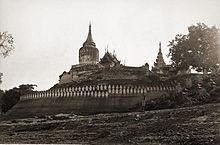Bagan History Part II
20th century to present

Bagan, located in an active earthquake zone, had suffered from many earthquakes over the ages, with over 400 recorded earthquakes between 1904 and 1975.[13] A major earthquake occurred on 8 July 1975, reaching 8 MM in Bagan and Myinkaba, and 7 MM in Nyaung-U.[14] The quake damaged many temples, in many cases, such as the Bupaya, severely and irreparably. Today, 2229 temples and pagodas remain.[15]
Many of these damaged pagodas underwent restorations in the 1990s by the military government, which sought to make Bagan an international tourist destination. However, the restoration efforts instead drew widespread condemnation from art historians and preservationists worldwide. Critics are aghast that the restorations paid little attention to original architectural styles, and used modern materials, and that the government has also established a golf course, a paved highway, and built a 61-meter (200-foot) watchtower. Although the government believed that the ancient capital's hundreds of (unrestored) temples and large corpus of stone inscriptions were more than sufficient to win the designation of UNESCO World Heritage Site,[16] the city has not been so designated, allegedly mainly on account of the restorations.[17]
Bagan today is a main tourist destination in the country's nascent tourism industry, which has long been the target of various boycott campaigns. The majority of over 300,000 international tourists to the country in 2011 are believed to have also visited Bagan.[citation needed] Several Burmese publications note that the city's small tourism infrastructure will have to expand rapidly even to meet a modest pickup in tourism in the following years.
On 24 August 2016, a major earthquake hit central Burma and again did major damage in Bagan; this time almost 400 temples were destroyed. The Sulamani and Myauk Guni (North Guni) were severely damaged. The Bagan Archaeological Department has started a survey and reconstruction effort with the help of UNESCO experts. Visitors are prohibited from entering 33 damaged temples.
good article , thanks for sharing.
thanks